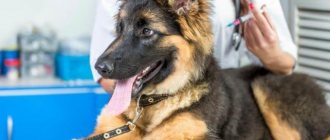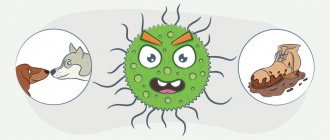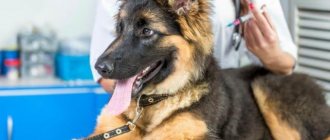The day has finally come when the long-awaited puppy appears in the house! In an instant, life became a little better, she was illuminated with new energy, fun and love. The only thing that overshadows this moment is concern for the life and health of a pet that is already beloved and dear to the heart.
In this regard, the relevant question is: “How to protect a puppy from possible diseases?” The answer is very simple - through vaccinations.
Necessity
The word “vaccination” means a special vaccine that is administered to an animal at certain periods of life and protects its body from the action of infectious agents.
The vaccine may contain live weakened or killed microorganisms. The introduction of these drugs reduces the risk of possible infection of the pet when encountering an infection, and in the event of a disease, it reduces the severity of complications. Therefore, vaccinating a dog is a top priority for any owner.
How does the vaccine work?
The vaccine, due to the content of antigenic determinants, creates artificial acquired immunity in the animal's body.
In other words, the dog’s immune system recognizes a weakened infectious agent, produces antibodies and creates clones of protective cells that are capable of destroying it. In the future, when encountering an infectious agent, the pet’s immunity will quickly destroy it, preventing the manifestation of clinical symptoms.
Types of vaccines
There are live, attenuated (weakened) and non-live vaccines. “Dead” vaccines are not capable of causing disease even in a weakened dog, so they are considered safer. However, immunity from such a vaccine is less intense and persistent than when using a live vaccine.
In this regard, vaccinating a dog using weakened microorganisms is more preferable, but only in absolutely healthy animals.
Based on the number of infectious agent antigens used, a distinction is made between mono-vaccines (creating immunity against one pathogen) and complex vaccines (containing antigens of several infections at once).
A complex vaccine for dogs containing antigens of pathogens of the following diseases has become widespread:
- canine distemper;
- parvovirus enteritis;
- infectious hepatitis;
- parainfluenza;
- leptospirosis.
Vaccination of dogs against rabies is usually carried out using a monovaccine.
Quarantine
After each vaccination, your pet must undergo a two-week quarantine. The fact is that a dog’s strong immunity is formed during this time, and the vaccine will not yet be able to protect its body from infection. During this period, it is not recommended to walk the dog, bathe it, overcool it, or subject it to physical activity. If there are other animals in the house that go outside, it is better to prevent the dog from coming into contact with them.
Which vaccine to choose
In Russia, the most widely used vaccines are those produced in the Netherlands (Nobivac) and France (Eurican); they are considered safer and more effective than their domestic counterparts.
Nobivac vaccine against rabies has received a large number of praises , since, unlike other drugs, it extremely rarely causes allergic reactions in animals due to the use of herbal remedies to obtain the pathogen antigen.
Other vaccines in the Nobivac series (Puppy DP, DHP, DHPPi) are positioned by many dog owners as potentially dangerous with the highest risk of developing allergies, including anaphylactic shock. Despite this significant drawback, vaccinating dogs with these drugs is very popular and demonstrates a high level of reliability in the development of stable immunity.
Some imported drugs and their domestic analogues can also be used to vaccinate an animal:
- “Multikan”, “Biovac”, “Polivak- (made in Russia);
- “Hexadog” (made in the USA - France), “Duramune” (USA), “Vanguard” (Belgium), “Primodog” (France).
As a rule, the above-mentioned products are characterized by an average level of safety and effectiveness, but are more affordable.
Side effects and complications
Injections can cause complications. The most common side effect is an allergy to the vaccine. The reaction is expressed in profuse salivation, lacrimation, involuntary defecation, swelling at the injection site.
After vaccination, they can suffer from a mild form of ARVI; they sneeze, cough, and have a fever. Sometimes complications are expressed in a more complex form. One of the most severe side effects after an injection can be post-vaccination sarcoma. This is a tumor that forms at the injection site. It can only be removed surgically.
Veterinary passport
An international veterinary passport is the most important document for a dog, without which long trips with a dog around the country, travel abroad, participation in exhibitions and breeding are impossible.
The most important points of a dog’s veterinary passport are:
- vaccination against rabies and other infectious animal diseases;
- flea and tick treatment;
- deworming;
- reproduction.
The document also contains information about the owner of the animal, identification (in the case of implantation of an electronic chip) and some characteristics of the dog, in particular gender, color and special features.
Why do you need a veterinary passport?
This is a small book that is sold in many veterinary pharmacies/clinics. Costs about 50 rubles. Data about the dog and all veterinary preventive measures are entered here: treatment, operations, vaccinations, treatments for parasites, etc.
Each vaccine has a label with an individual serial number and release date. It is pasted into the appropriate box in the passport. The doctor’s signature is placed next to it and all this is supported by his personal seal or the seal of the clinic. This is proof that the procedure was carried out, as well as a “reminder” of when to do the next one and which one.
A veterinary passport without stamps is not a document and cannot be presented at exhibitions, when moving, flying, or in the event of a dog bite (if it is necessary to prove that it does not have rabies).
Vaccination will help protect your pet from dangerous infectious diseases.
When should you give your puppy his first vaccinations?
The responsibility for administering the puppy's first vaccination falls on the shoulders of the conscientious breeder. If the mandatory vaccinations were not completed before the sale, this hassle falls on the new owners, who have to worry about when to give the puppy the first vaccination.
Puppy vaccination is carried out at the age of 8-10 weeks. As a rule, vaccination of a puppy at 2 months involves the use of vaccines against all major canine diseases, except rabies. The first rabies vaccination is given to the dog only after three weeks. At the same time, the puppy is given a second vaccination using complex vaccines against infectious diseases.
How to prepare a puppy for its first vaccination
Before the puppy’s first vaccination, it is necessary to take a responsible approach to both the choice of vaccine (decide with the manufacturer, check the expiration date and storage conditions) and the preparation of the patient himself.
It is unacceptable to vaccinate an animal if it is already infected or affected by parasites.
Two weeks before vaccination, the puppy should be dewormed and monitored for parasites in the feces. To treat puppies against parasites, it is recommended to use drugs in the form of a suspension.
It is recommended to vaccinate the puppy on an empty stomach in the morning. If this event is scheduled for the afternoon, you can feed the dog 2-3 hours before vaccination.
And if there are complications: what is normal and what is pathological?
Any vaccination weakens the living organism; for several days the animals feel lethargic and weak. Dogs have to endure the very first immunization with great effort. The following symptoms may appear:
- the temperature rises briefly, not higher than 39°C;
- the injection site hurts and swells;
- the puppy refuses food once;
- one-time vomiting and diarrhea;
- the baby is lethargic, feels unwell, sleeps a lot, gets tired quickly, and does not want to play.
The occurrence of such accompanying phenomena is normal. There is no need to be afraid of this.
You should seek help from a veterinarian if your puppy exhibits the following complications:
- 40-degree temperature that does not subside for more than 2 days;
- the baby refuses to eat for 24 hours;
- The puppy has been vomiting for more than a day or has frequent loose stools;
- the puppy has a profuse nosebleed, increased lacrimation and salivation;
- convulsive manifestations.
All of these are pathological phenomena that require urgent medical attention from a veterinarian.
Like any medicine, serum is allergenic. Allergies are indicated by:
- dyspnea;
- itchy injection site;
- blue mucous membrane;
- skin rashes;
- redness;
- puppy's sleepy state.
It is recommended to do the vaccination at home or stay at the clinic for about half an hour. During this time, allergic reactions to the vaccine will manifest themselves. If negative phenomena occur, the veterinarian will be able to provide the necessary assistance.
Vaccinations against major diseases
Rabies
Rabies is a dangerous viral disease that affects warm-blooded animals and humans. Infection is possible when the virus penetrates through damaged skin or mucous membranes, as well as through the nutritional route (the pathogen penetrates through the mucous membranes of the oral cavity with contaminated meat). The mortality rate from rabies is 100%. The disease cannot be cured.
A puppy's rabies vaccination is mandatory. It is carried out 3-4 weeks after the first vaccination with revaccination once a year. The drugs used are Nobivac Rabies, Rabisin-R, Defensor 3, Rabican (strain Shchelkovo-51).
Parvovirus enteritis
Parvovirus enteritis is one of the most common infectious diseases of carnivores. It is highly contagious, with a mortality rate reaching 80%. The disease occurs in an extremely severe form, especially among puppies under six months of age, and is accompanied by profuse vomiting, myocarditis, and severe dehydration.
Vaccination against enteritis is carried out at the age of 8 weeks and, as a rule, is part of a complex vaccination (Nobivac DHPPi). In some cases, mono-vaccines can be used for vaccination: Biovac-P, Primodog, Nobivac Parvo-C.
Carnivore plague
Carnivore plague has been known since the mid-18th century. Despite the emergence of modern methods of prevention and treatment, mortality rates range from 60 to 85%. Distemper is an infectious disease of viral etiology.
The following manifestations are observed in the clinic: fever, pneumonia, inflammation in the mucous membranes of internal organs, disorders of the gastrointestinal tract and nervous system.
Specific prevention of canine distemper is vaccination. The first vaccination is given at 2 months as part of a comprehensive vaccination for dogs.
Leptospirosis
Leptospirosis is a bacterial infection with a high mortality rate (up to 90%). The source of infection is a warm-blooded animal (rodents, commercial and domestic animals). Infection occurs through damaged skin and mucous membranes, as well as through nutrition.
The disease is characterized by damage to the intima of small vessels, acute intoxication of the body and, as a result, disruption of the functioning of vital organs.
Vaccination of puppies at 2 months of age necessarily includes vaccination against leptospirosis. Antigenic determinants of the pathogen are included in all common complex vaccines. In exceptional cases, a monovaccine can be used: “Nobivac Lepto”, “Biovac-L”.
Parainfluenza
Parainfluenza is a highly contagious viral infection that affects the dog's upper respiratory tract. Airborne transmission is typical. Mostly unvaccinated puppies under the age of 1 year get sick. The mortality rate is low: the disease is successfully treated and ends with complete recovery, in rare cases - viral carriage.
A polyvalent vaccine is used to vaccinate puppies against parainfluenza. Complex vaccination “Eurican DHPPI2-L” and “Nobivac DHPPi+L” (containing antigenic determinants of pathogens of plague, hepatitis, enteritis, parainfluenza and leptospirosis) is given at the age of 8 and 12 weeks.
Lyme disease
Lyme disease is a classic naturally occurring obligate transmissible borreliosis. The causative agents are bacteria of the genus Borrelia, ecologically associated with some species of ticks of the genus Ixodes (Ixodes). Infection of ticks with Borrelia in some regions of Russia reaches 20%.
Dogs vary in their individual sensitivity to Borrelia. In this case, the disease can be asymptomatic (in 10% of pets) or with full-blown clinical symptoms affecting internal organs and the musculoskeletal system.
Tick vaccination for dogs is not mandatory, but its use is necessary if living in an area where Lyme borreliosis is endemic.
Coronavirus infection
The causative agent of coronavirus infection is viruses of the Coronaviridae family, which infect the cells of the mucous membrane of the small intestine. As a rule, the disease is asymptomatic and does not pose a significant danger to the pet.
Vaccination against this disease is not included in the standard vaccination schedule for dogs. At the request of the owner, vaccination can be given in case of a high risk of infection with parvovirus enteritis, which is explained by their mutual aggravating effect on the course of the disease.
Basic rules for dog vaccination
Vaccination is a serious stress for the dog’s body, so it is necessary to minimize the risks of possible complications.
This becomes possible by following the basic rules of vaccination:
- Vaccination is possible only for healthy dogs;
- preliminary deworming, flea and tick treatment two weeks in advance;
- vaccination in advance of the intended mating (2-3 months).
Also, when vaccinating, you must adhere to the following basic principles:
- Vaccinations for dogs are carried out strictly according to age;
- It is not recommended to vaccinate puppies before 8 weeks of age due to the high activity of maternal antibodies;
- vaccination is carried out using routine vaccinations according to the dog vaccination schedule;
- Annual vaccination of dogs is carried out in order to maintain strong immunity;
- The vaccination program includes: mandatory vaccinations (rabies, enteritis, canine distemper, parainfluenza and leptospirosis) and vaccinations in endemic areas (Lyme disease, coronavirus enteritis).
Exceptions to the rules
Sometimes the vaccination schedule may shift. Typically, this may be influenced by the following factors:
- Epidemiological situation in the area. The standard vaccination schedule may change based on dangerous outbreaks of infection. In this case, puppies can begin to be vaccinated at one month of age with special vaccines.
- Being forced to move early can also shift your schedule. In this case, you must adhere to the following rule: vaccination should be given no earlier than one month of age and no later than 10 days before the planned trip.
- Particular attention should be paid to puppies raised without a mother; a very important factor is how many days the first vaccination was given. Since, on the one hand, they need to increase their immunity, and on the other, try to carry out immunization in the most gentle manner. They can begin vaccination at 6 weeks of age, and subsequently reinforced at 9 or 12 weeks.
Vaccination schedule
The classic option for puppy vaccination is vaccination from eight weeks of age. In this case, a complex vaccine is given at 2 months, and after 21 days a revaccination is performed. At the same time, they are vaccinated against rabies. After the final change of teeth, a comprehensive vaccination is given. Next, the dog is revaccinated once a year with a polyvalent vaccine and a monovalent rabies vaccine.
Along with the classic option, an alternative vaccination schedule for puppies is possible. In this case, the baby is vaccinated from a very early age - 4 weeks using a special vaccine for puppies (Nobivac Puppy) against canine distemper and parvovirus enteritis. At 8-10 weeks a complex vaccination is given. Next, the classic scheme is repeated.
It should be remembered that only an experienced veterinarian, taking into account the current condition of the pet, should decide on the answers to the questions: “When should a puppy have vaccinations?”, “What vaccinations should a puppy have at the moment?” and “Which vaccination regimen is appropriate for a particular patient?”
Features of vaccination depending on breed
Breed does not affect the vaccination order. The dosage of the drug is standard for all breeds. Increasing or decreasing the recommended dose may result in a lack of effect or the development of complications.
Exceptions include breeds at risk. But even in this case, all changes are discussed with the veterinarian.
Answers to common questions
To summarize, we will answer the most frequently asked questions about vaccination.
- What vaccinations does a puppy need? — The puppy must be vaccinated against the main infectious diseases of dogs: rabies, leptospirosis, parvovirus enteritis, parainfluenza, canine distemper. If desired, for Lyme disease and coronavirus infection.
- What vaccinations does an adult dog need? — An adult dog must be vaccinated against the same diseases as a puppy.
- At what age are puppies vaccinated? - Depending on the chosen vaccination regimen - in 4-6 or 8-12 weeks.
- When should an adult dog be vaccinated? — Starting from the age of one year, distemper vaccinations for dogs and complex vaccinations are given once a year.
- What vaccinations does a puppy need to have before the age of 1 year? — According to the classical scheme, within 1 year the dog will be given: 3 polyvalent vaccines, 2 rabies vaccines. According to an alternative scheme - 1 vaccine for puppies, 3 complex vaccines, 2 rabies vaccines.
- What vaccinations are required? — Vaccination against rabies, leptospirosis, parvovirus enteritis, parainfluenza, and canine distemper is required.
- How much do puppy vaccinations cost? — The Nobivac Puppy vaccine costs an average of 300 rubles per dose.
- How much does it cost to vaccinate a dog? — One trip to the veterinary clinic for vaccination will cost 900-1000 rubles in the regions, 1100-1300 in Moscow and the Moscow region.
Vaccination of a beloved dog is an important stage in the life of any owner. Even before purchasing a puppy, you should worry about how to fully protect its life. We should also not forget that when taking home a little bundle of life, you have to take on full responsibility and numerous difficulties. Fortunately, to this day the phrase of A. Exupery remains extremely relevant: “We are responsible for those we have tamed.”










